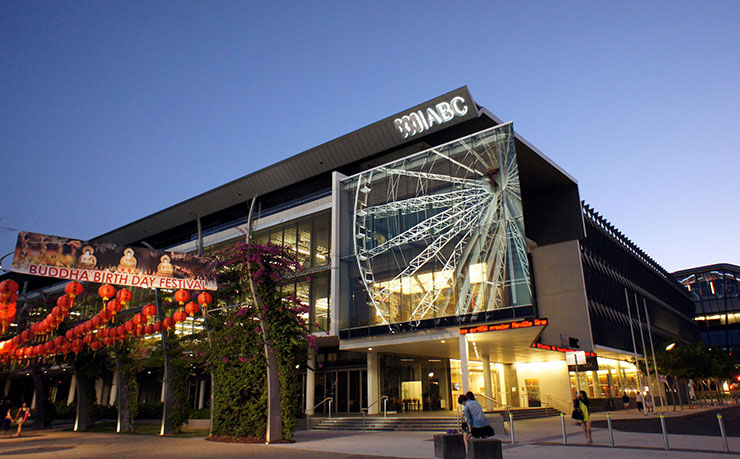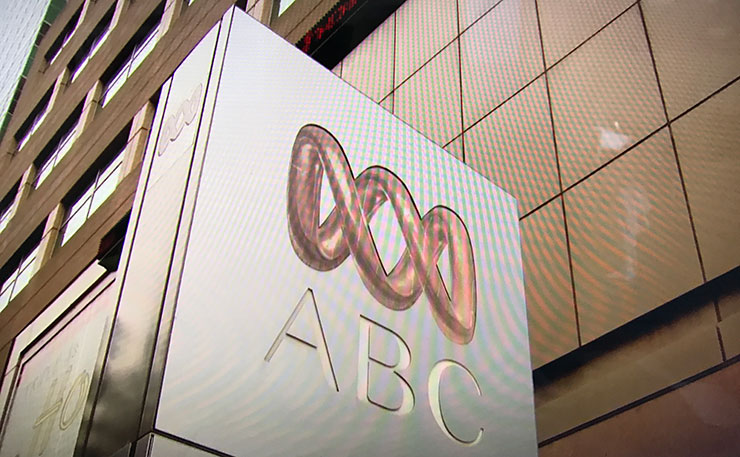In July it is predicted that cross-media ownership rules will be abolished by the Howard Government and Aunty might be in a spot of bother.
Those of us feeling a touch paranoid about Packer owning Fairfax, or Murdoch getting his hands on a television station, are somewhat consoled by the presence of the ABC. Yet how realistic is it to expect that an under-funded and besieged Aunty will be able to perform her watchdog role when the pack is baying for her blood?
The ABC has already paid dearly for scrutinising government and big business without fear or favour, and for behaving as if she’s a guardian of the Fourth Estate. Politicians of all persuasions have been cross with her; most recently it was nasty old Dick Alston, but Paul Keating, Bob Hawke, not to mention Aunty’s favourite nephew, Jeff Kennett, have all been equally displeased with her coverage during their period in office.
Let’s not point out the bleeding obvious here.
But nothing holds a candle to the present government’s war of attrition; boards stacked with liberal cronies, budgets decimated and reporters vilified. A now vulnerable Aunty has to bend over backwards to please the hand that feeds her, bowing to populist demand, and even lifting her skirts, to chase ratings.
Outsourced and demoralised as she is, she’s had more than a little success to boast of to a board more interested in dollars than a Charter that talks about the public interest. It would be churlish not to acknowledge the quality of some popular programming but imprudent not to consider what is being lost in order to seduce new audiences who want little more from Aunty than for her to entertain them.
And what does this mean for some of Aunty’s lesser known relatives including Radio National; a public sphere of ideas where interviews last longer than a soundbite and journalists investigate to bring us content that restores some balance to the pervading dross, which if you let it, might amuse you to death.
Radio National is intellectual, esoteric and sometimes challenging, but as Philip Adams often reminds us, only Gladys is listening. He’s not joking; with ratings at less than three per cent, you had better enjoy it while you can “ such an under-performer is sure to be on Howard’s hit list.
ABC’s flagship radio current affairs show, AM (along with The World Today and PM) had better watch its back, too; AM was accused of more than sixty counts of serious bias when reporting the allied invasion of Iraq. A subsequent independent investigation severely embarrassed the Howard Government and Senator Alston, the then Federal Communications Minister, who had made the allegations, by finding all but two of the charges unfounded. It’s not surprising then, that a government used – with a few notable exceptions – to a sycophantic press, becomes incensed when held accountable.
Aunty has, in her many incarnations, under intense political examination and often deprived circumstances, bonded Australians far and wide, in cities, country regions and the outback; a network of diverse, yet shared identity, which talked of nation and nationhood, community and kinship. She has not however, spared us a ‘warts-and-all’ look at ourselves.

A very first memory of ABC television was a Four Corners episode that brought home to me the absolute neglect of Aboriginal people, which in my outer suburban enclave, had never intruded upon my consciousness, let alone my conscience. It was an awakening that could not, indeed cannot take place on commercial television, where national identity is defined by narrow and superficial representations of what it means to be Australian. Aunty, once proud of nurturing her country’s cultural heart, now has few opportunities to offer the artists, writers, orchestras et al, the creative sanctuary previously found at the ABC. Media barons, while clearly devotees of popular culture, steer away from anything that might alienate the large audiences advertisers seek. Their financial interests are much better served by imported fare (and I’m not talking SBS world movies here) than pleasing a measly two or even five percent of the Australian population.
If big media players are allowed to extend their dominion and fatten their wallets, who in the as-good-as-unregulated commercial media will want a debate about the (mis)fortunes of the national broadcaster? Would Packer or Murdoch lose sleep if the ABC is further gutted, commercialised or privatised. And while privatisation may seem like a conspiratorial rant, think Qantas, the Commonwealth Bank and let’s not forget Telstra. Indeed, now retired Senator Alston was more than keen on the partially-pregnant-privatisation-deal – a recurring motif of the Howard Government – mooted by Michael Kroger in 1999. He proposed part privatisation of the very successful ABC Online (rated by Nielsen/Netratings as one of the top five news and information sites) that would have seen a 49 per cent sell-off to commercial interests. Sounding familiar? It was rebuffed by then Managing Director Brian Johns, but served to ring alarm bells that have not yet been silenced.
There has also been, if not a relentless demagoguery, an at least persistent narrative, particularly in the Murdoch press, that posits advertising as the answer to Aunty’s budget woes, a refrain that has been picked up by some commentators and journalists who ought to know better. It is fatuous, at best, to argue that the independence and integrity of the public broadcaster would not be mortally wounded should advertising become its life-blood. What Aunty needs is adequate funding, which in real terms has fallen by 200 million dollars since 1986, to allow her to fulfil her Charter; that is to compete for traditional audiences, without political apparatchiks banging on about ratings or using bully tactics to silence her, and to attract a next generation of Australians who are seeking quality and objectivity; to do otherwise is to sign her own death warrant.
While we know Murdoch is no friend of the ‘f…… ABC’ he’s a good mate of Howard, and said as much during the last and previous elections by giving him his vote in the 70 per cent of Australian newspapers he owns. But Howard was doubly blessed. James Packer, son of Kerry, gave Howard the thumbs up during the election campaign, and the boys club at Channel Nine endorsed their master’s voice at every opportunity available to them. The government won a landslide result that surprised even them. John Howard will shortly express his gratitude.
There is no doubt that monopoly power in Australia’s media is set to increase to levels that puts democracy dangerously at risk. Aunty, whose commercial yet editorially independent ally, Fairfax, likely to be swallowed whole by Packer, will have no-one to cry wolf when she too, gets ‘done over’.
Aunty’s been starved of funding, beaten into submission and found wanting. But she’s still our ABC and her Australian family needs her more than ever.
You Might Also Be Interested In…
• ‘Closing the door on your right to know’ by Margo Kingston, June 22, 2003
• ABC, The Media Report, ‘Unchaining the Channels’, 5 June 2003
• Essay by James Fallows called ‘The Age of Murdoch’ in the Atlantic Monthly
• Thomas, Julian (2001), ‘Media Ownership Rules are Part of a Larger Problem’, Australian Review of Public Affairs
Donate To New Matilda
New Matilda is a small, independent media outlet. We survive through reader contributions, and never losing a lawsuit. If you got something from this article, giving something back helps us to continue speaking truth to power. Every little bit counts.




